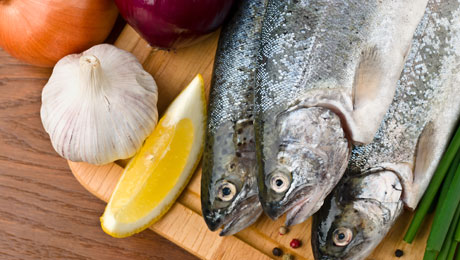Pictures: www.clickatlife.gr
One of the biggest problems of the West's food habits is the lack of omega-3 fatty acids. Omega-3 fatty acids are not produced by the human body, which is why we have to provide them with our food.
The various eating habits of people living in two different countries represent a simple comparative example of the importance of fish in our diet. More specifically, the Japanese, who consume an average of 100 grams of fish per day, suffer 50% fewer heart attacks than the Americans whose national dish is the burger.
However, such distant examples are not necessary in order to understand how useful the regular consumption of fish is. It suffices to remember the habit of our grandparents, who used fish oil, the smell of which was enough to kill viruses.
The recommended dose of nutritionists includes a fish main course twice per week, which gives us the important 500 g omega-3 fatty acids, which the body needs per day.
Besides omega-3 fatty acids, fish contains a lot of proteins, vitamins and minerals, such as zinc, iron and calcium. Furthermore, fish has a lower saturated fat content compared to other types of meat, which makes it ideal for a diet which is low in fat.
Heart health

If you want to reduce the chance of a heart attack by one third, then you’d better start eating fish twice per week. Omega-3 fatty acids improve the health of the heart, reducing the chances of developing an arrhythmia, delaying the formation of plaque in the arteries, and regulating the levels of triglycerides, as well as blood pressure levels.
Finally, you will significantly reduce the likelihood of a stroke. A survey of 20,000 men showed that weekly consumption of fish reduces the risk of cardiac arrest by half!
Anticancer properties
Studies have found that women who take in fish oil via food supplements reduce the risk of breast cancer by 32%. Similar studies in men have also showed threefold reduction in the likelihood of prostate cancer in those who have included fish in their daily diet. Furthermore, the anti-inflammatory action of fish improves the overall protection of the body against cancer.
Food for the brain
Fish is excellent for supporting brain function. Omega-3 fatty acids aid concentration and reduce the likelihood of developing Alzheimer's disease by 60%. Whether you are a young student or not, remember that fish is good for you.
Easily digestible food

White fish does not hamper the digestive system at all and is therefore an ideal food for the elderly, or for those with poor digestion. Via fish, you give your body many nutrients without overloading the digestive system. Therefore, every time you want to have a light and healthy meal, your first choice should be fish.
Anti-inflammatory properties
Omega-3 fatty acids that are found in abundance in all kinds of fish have significant anti-inflammatory effects. Among other things, they soothe swollen joints in rheumatoid arthritis and other related problems, and people who regularly eat fish or take fish oil supplements enjoy greater flexibility of the joints and move more smoothly. The same anti-inflammatory effect brings relief in cases of dermatological disorders such as psoriasis, whether fish oil is consumed or applied as skin cream. Furthermore, it is very important that omega-3 fatty acids have an effect on autoimmune diseases.
Finally, omega-3 fatty acids significantly reduce the risk of type 2 diabetes, even in the case of people with a high chance of developing diabetes at some point in their life.
Eye Health

Fish is good for eye health, too. A diet containing fish helps to reduce the occurrence of macular degeneration that comes with age and which is the most frequent progressive vision loss in people aged over 50.
Better respiratory system
Another important result of the anti-inflammatory action of omega-3 fatty acids is the fact that they reduce asthma attacks. Australian studies of children with asthma who eat fish regularly showed a reduction of crises by 75%!
Plenty of choices
The best thing about fish is that there are many choices. Although some people don’t like the smell of fish and think that it is difficult to prepare, there is always a kind of fish that is easy to cook so that its smell will not bother you.
For a rich taste, try salmon. It is rich in omega-3 fatty acids and a good source of vitamin D. Always prefer wild salmon instead of farmed fish. Trout also contains omega-3 fatty acids which even exceed the recommended daily intake, as well as vitamin B12, which also improves heart health.
Cod’s buttery flavour makes it particularly popular even among those who do not like fish. It is high in omega-3 fatty acids and a good source of selenium. Sardines, anchovies, and sprats are easy to prepare and mullet, bream and sea bass are just a few of the gifts offered by the Greek seas.
The price of fresh fish may be high, but you should consider fish as an investment for better health, rather than as just food.